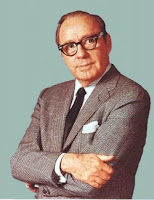
About a year ago, I wrote a post about the strange American phenomenon, "bowl season," when college football teams play before large stadia-audiences and cameras, each bowl sponsored by corporations and each team's university rewarded handsomely with cash. I even looked up "bowl" in the OED online, and if memory serves (it rarely does), "bowl" in connection with American football, stadia, and the games played in the stadia entered the language early in the 20th century. (Pictured is the Rose Bowl stadium in Pasadena, where the game, the Rose Bowl, is redundantly played.)
Bowls (of this kind) must be one of those American traditions that flummox many observers of American culture. Probably Europeans can connect bowls in some vague way with soccer competitions, but the proliferation of bowls, the bewildering way in which teams are selected, and the corporate sponsorship must seem impenetrable.
When I was a lad (this was in the 17th century), the main bowls were the Sugar, Rose, and Orange Bowls, and then the Blue Bonnet and Sun Bowls seemed to sneak in there. The proliferation seemed to occur in the early 1980s, so that now there's the Holiday Bowl, the Poinsettia Bowl, and a bowl of bowls with corporate names.
In last year's post, I listed bowls I'd prefer to watch in place of the current ones. My favorite possibility is still the Despair Bowl, in which the two most inept, despondent teams in the land compete--or commiserate. I also liked the Absurdity Bowl and the Zen Bowl. The Poetry Bowl is probably an acquired taste.
Corporate-sponsors were so eager to support these bowls last year that I thought I'd offer up more great ideas, including the Obsessive Compulsive Bowl, in which both teams run the same play throughout the game, trying to make it perfect, and the crowd loves it because they share the same trait with the compulsive players and coaches. I agree that this may not make for "good television." I, however, would find it compelling.
Putin and Cheney, among others, seem so wistful for Cold War days that I think we may need the Cold War Nostalgia Bowl to exorcise these demons ritualistically. The teams could allegedly represent the USA and the former USSR, but then of course both teams would include spies and double-agents. A musical tribute to Joseph McCarthy and Nikita Kruschev might occur at halftime. Left-leaning fans could wear pink. Illegal wire-taps would be placed on all telephones affiliated with the teams.
The "Where's Our Money, Buster?" Bowl might be appropriate for this year. The teams would be made up of bankers, and we'd need to make the field extremely muddy. The winning team would earn the privilege of helping people rescue their foreclosed homes.
The Post-Modern Visual Media Bowl might work. All players and coaches and all fans in the stadium would wear their own wee video camera, first-person perspective, and the resulting maelstrom of images would be broadcast, perhaps with some great electronic music, the kind associated with raves. We'd all experience the experience of experiencing the experiences of the bowl, but don't worry; we'd still have traditional commercial advertisements, just so we could catch our breaths.
I'm so alienated from college football now that I don't know which teams are playing in what bowls for what illusory status. By chance, I do know that the TCU Horned Frogs defeated the Boise State Idahoans (I made up that last part--I think the mascot may be a bronco or a fox terrier--some kind of animal) in the Poinsettia Bowl last night. And I still don't like poinsettias.










